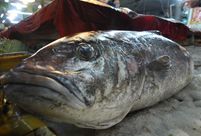 Bikini show in 2014 China Final of Miss Tourism World
Bikini show in 2014 China Final of Miss Tourism World
 Close-up view of August Aerobatic Team
Close-up view of August Aerobatic Team
 Goddesses married in 2014
Goddesses married in 2014
 Polar region photos raise worldwide awareness of global warming
Polar region photos raise worldwide awareness of global warming
 Get off at the last stop — Beijing Subway in vision
Get off at the last stop — Beijing Subway in vision
 Top 100 beauties in the world!
Top 100 beauties in the world!
 Gallery: Who is the most beautiful one?
Gallery: Who is the most beautiful one?
 If you like autumn, put your hands in the air!
If you like autumn, put your hands in the air!
 Fan Bingbing's "Queen style" in new play
Fan Bingbing's "Queen style" in new play
 Lingerie show at 2014 Miss China
Lingerie show at 2014 Miss China
The Ministry of Education will implement stronger scrutiny over the university system's leaders and impose harsher punishments for corruption, the country's top anti-graft agency said on Sunday.
The Central Commission for Discipline Inspection of the Communist Party of China published, on Sunday, 18 measures developed by the Education Ministry that require ministry-affiliated institutes and colleges to strengthen supervision over key processes, including promotions, enrollment, campus construction and the allocation of research funds.
Anti-graft supervision should specifically target high-ranking officials such as college presidents, deans and admission officials, who hold absolute power in major areas related to the allocation of resources and funds as well as staff appointments, according to the measures.
The Ministry of Education also requires its affiliated departments and colleges to strictly implement the clean-governance standards for officials' office occupancy, government-car use, business trips and official receptions.
The measures state that disciplinary bodies should regularly inspect school officials' personal finances, housing conditions and gifts received, in the wake of a series of corruption scandals involving university officials.
Zhong Binglin, president of the Chinese Society of Education, applauded the supervision-strengthening measures while stressing that decentralizing administrative power within schools is crucial as well.
"The decision-making system in China's universities should be changed by a multiple-stakeholder system-something like school boards overseas-to balance the current centralization of power, along with instilling proper supervision and accountability mechanisms," Zhong said.
Most college presidents and other high-ranking officials in key departments are appointed by higher-level governments rather than being elected, giving them absolute power, which in turn has created a breeding ground for corruption.
At least five university presidents and high-ranking officials stepped down in 2013 after being investigated on corruption charges.
Cai Rongsheng, former head of admissions at Beijing's Renmin University of China, was arrested in May on charges of receiving huge bribes for selling university admission seats.
Cai was put under official investigation in November 2013 after being accused of taking over 10 million yuan ($1.6 million) to "help" students get enrolled by the high-profile university.
Chen Yingxu, a former professor at Zhejiang University, was sentenced to 10 years in jail by the Intermediate People's Court of Hangzhou, Zhejiang province, in January for embezzling more than 9 million yuan of research funds by fabricating receipts and contracts.
In late December 2013, Chu Jian, then vice-president of Zhejiang University, was investigated for allegedly misappropriating State-owned assets.
 Joint anti-piracy drill
Joint anti-piracy drill Unknown 'monster' fish caught in Shandong
Unknown 'monster' fish caught in Shandong 20 years on: Relocated Three Gorges residents through lens
20 years on: Relocated Three Gorges residents through lens Beautiful Chinese woman
Beautiful Chinese woman Chestnut girl goes viral online
Chestnut girl goes viral online PLA HK Garrison veterans leave behind beautiful smiles
PLA HK Garrison veterans leave behind beautiful smiles Victoria's Secret Fashion Show
Victoria's Secret Fashion Show Representative beauties
Representative beauties Excellent photos of Zhuhai Air Show
Excellent photos of Zhuhai Air Show Thaw in US-Cuba ties offers broad lessons
Thaw in US-Cuba ties offers broad lessons China keeping close eye on ruble
China keeping close eye on ruble Macao’s relations with mainland strong despite Hong Kong protests
Macao’s relations with mainland strong despite Hong Kong protests Chinese literature steps up going abroad while online literature booms
Chinese literature steps up going abroad while online literature boomsDay|Week|Month